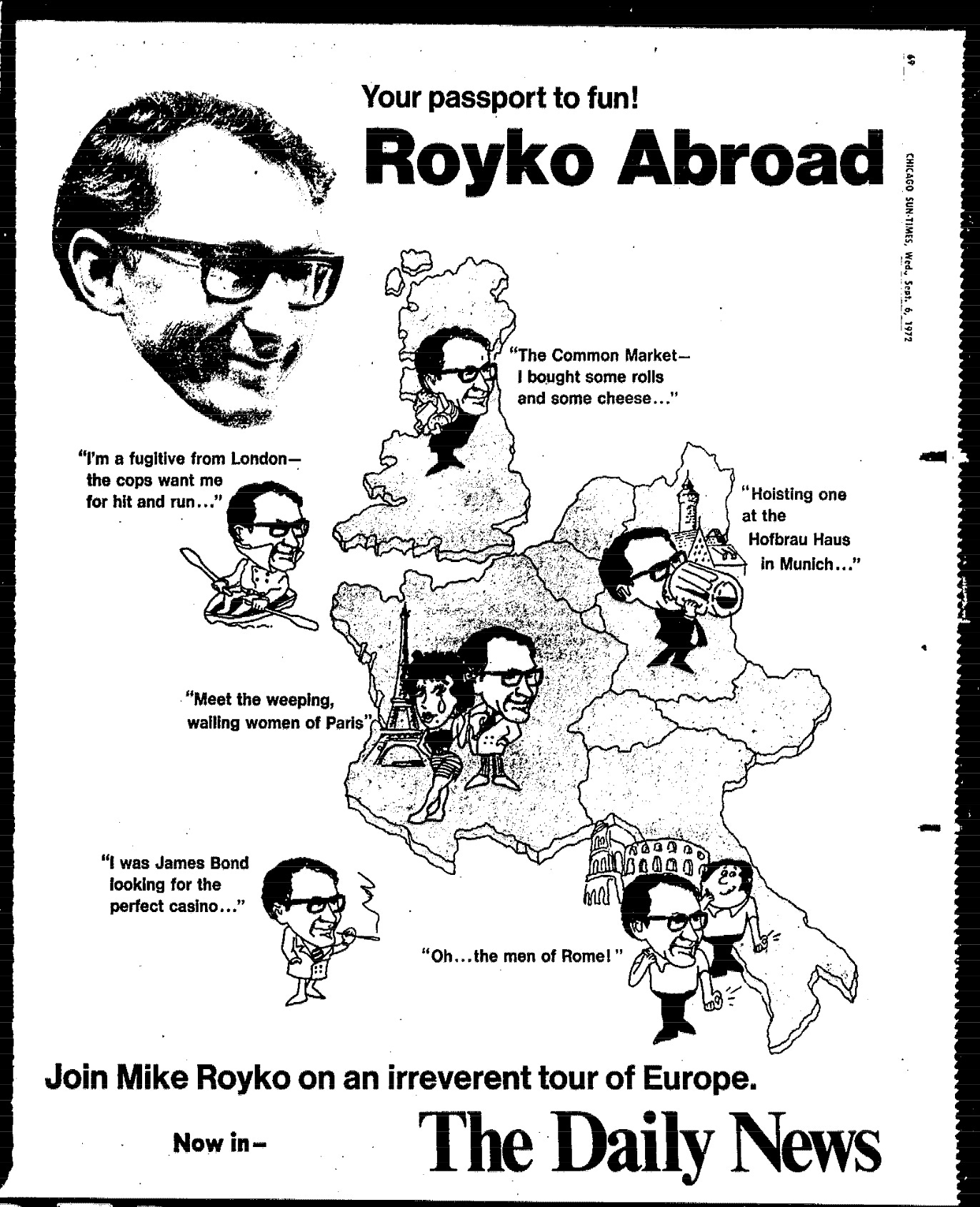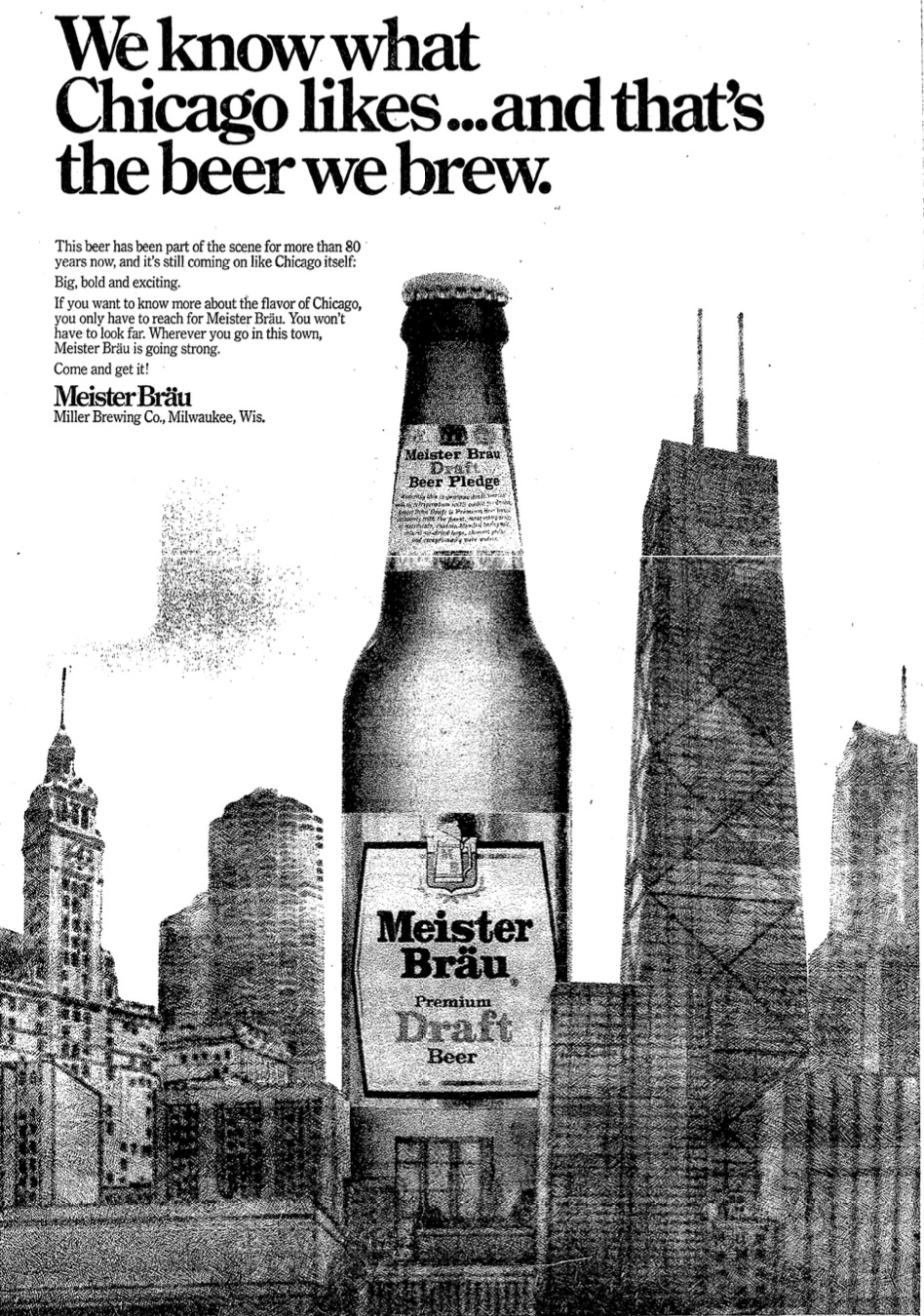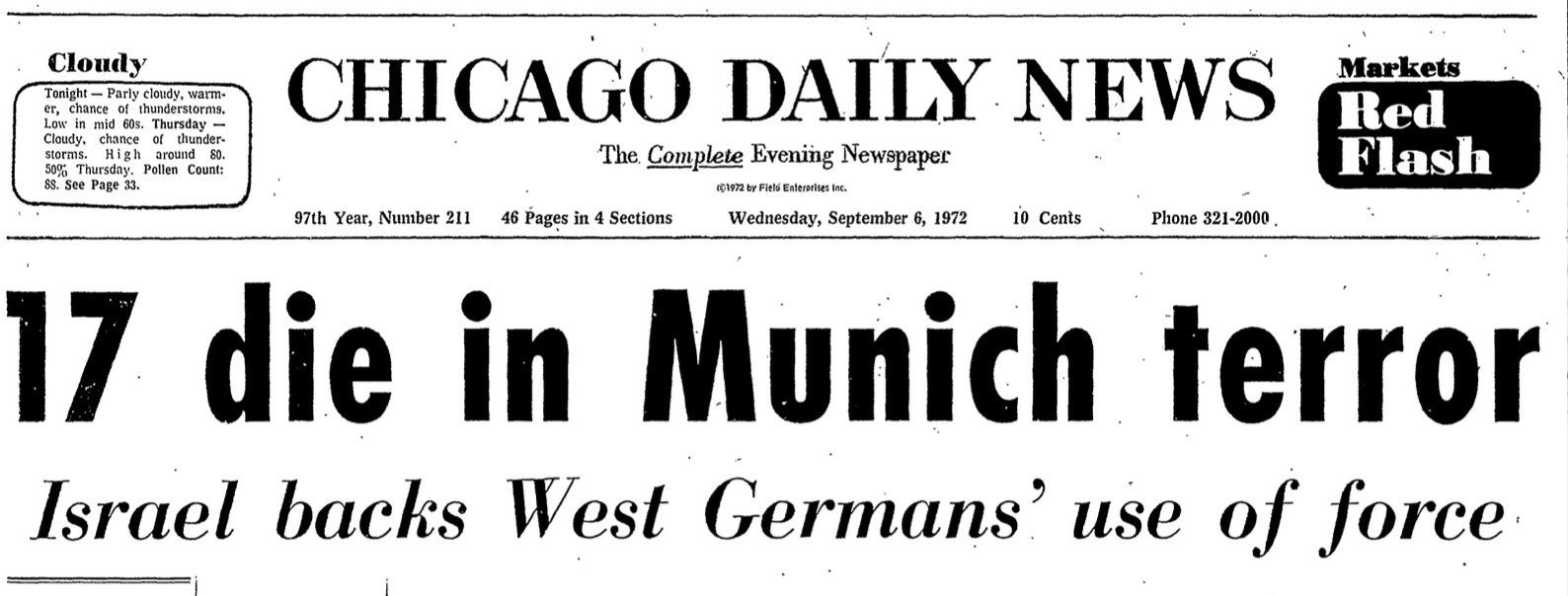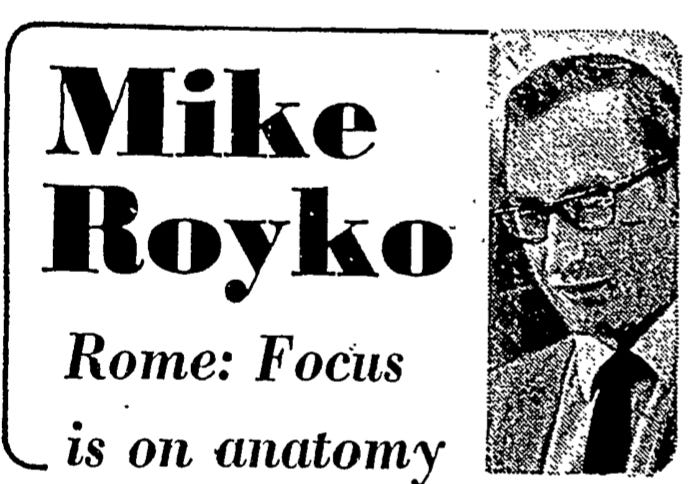To access all site contents, click HERE.
Why do we run this separate item, Mike Royko 50 Years Ago Today? Because Steve Bertolucci, the hero of the serialized novel central to this Substack, “Roseland, Chicago: 1972,” lived in a Daily News household. The Bertoluccis subscribed to the Daily News, and back then everybody read the paper, even kids. And if you read the Daily News, you read Mike Royko. Get your Royko fix on Twitter too: @RoselandChi1972.
Chicago Sun-Times
September 6, 1972: full page
The last time 1972 Daily News readers got their brand-new Royko fix was July 21. But, if that’s what it takes to get a full page of Royko cartoons, maybe it was worth it.
You’d think this great full-page promo would have run in the Daily News too, as I did, but we would be wrong. No—somebody put this great ad together and ran it once. The Daily News took one cartoon out of it—the beer-drinking one—and used it a single time.
To clarify how deprived Royko readers were in the summer of ‘72, let’s review. After Royko’s July 21 column, for two weeks the paper ran favorite past columns with this stripe of type in the middle:
But the greatest hits stopped abruptly on Monday, Aug. 14 when readers saw this at the top of page 3 instead:
Three weeks passed with that uncommunicative tagline. Three weeks!
Finally, on Friday, September 1:
Then, in the September 2-3 weekend edition:
It’s been a long Royko break. Let’s get to it. These are not Mike’s best columns—just my opinion—but they’re fun nonetheless. September 5 is the highlight. You can read the Sept. 5, 6 and 8 columns in full in “Slats Grobnik and Some Other Friends”—so go get it!
.
Every day this week, the Daily News runs a Royko promo on page one, so we’ll include the headline and promo from each issue.
September 4, 1972
No Daily News on Labor Day, so still no Royko.
September 5, 1972
It’s a little odd reading a light-hearted humor piece about beer in Munich on page three, after you’ve seen what’s on page one. The Olympics being attacked, for the few who don’t know, is in Munich. But, of course, Mike was in Munich days or weeks earlier. It’s very bad timing. If the Daily News had put out a Labor Day edition, Mike’s fun beer column would have reached readers before Munich became synonymous instead with terrorism and death.
One other point: As we’ll read in the Weekend Edition, Mike was touring Europe with his family. Any columnist in 2022 would take that vacation and churn out a string of pieces ready to turn into so many “Modern Family” scripts. But as Royko readers, you already know Mike rarely mentions his wife and kids. Instead, these columns give the rather odd impression that Mike is all by himself, perhaps on an extended business trip, even when he eats at Maxim’s.
“MUNICH—Unlike most visitors, I didn’t come here for the Olympics,” writes Mike in his first sentence back, and the next sentence is pure Chicago 1972:
“If I want to watch young black men and young white men chasing each other on foot, I can always go south on Chicago’s Ashland Av.”
“I came here to have a beer. It has become impossible to get good beer in the United States, but this is the beer-drinking capital of the world.”
Younger Readers: 1972 was a dark time before organic micro-breweries dotted the land. In fact, 1972 Chicago had exactly one brewery left the whole city. The independent small brewers had all gone out of business, or gotten gulped down by behemoth corporations like Budweiser and Miller, located in far away strange places like Milwaukee. (Just kidding!)
Even Meister Brau is just about to leave Chicago. On June 30, Chicagoans learned that 300 of their fellows will be tossed out of work because Miller bought Meister Brau and plans to close the plant at North Avenue and Sheffield. (As noted elsewhere, the site at the northwest corner of that intersection would later become a shopping plaza originally housing the city’s first Whole Foods.)
But let’s be realistic. Meister Brau was not a craft beer. Lowenbrau and Michelob were as fancy as you got, beer-wise, in 1972. That’s why Mike had to go to Germany for a decent beer.
“The king of Munich’s beer halls—and my destination—is the venerable Hofbrau House. The main beer room on the first floor looks bigger than a couple of gymnasiums.” It’s full, Mike claims, of “enormous waitresses and enormous customers.”
As Mike sits down, a waitress slams down a stein of beer in front of him—the smallest size available, one liter. You can imagine the state of Mike’s fellow beer hall patrons.
“Sociologists have differing views on this kind of activity,” Mike writes.
“Some say it is beneficial for Bavarians to remain indoors and groggy because that makes them less likely to march across somebody’s border.
“On the other hand, while they are indoors and groggy, they have been known to be easily inspired by crazy orators who urge them to march across somebody’s border.”
A young American man soon starts unsteadily toward the door—trying to hide a beer stein behind his back.
The steins are for sale. Signs specifically warn customers not to steal them. One of the enormous waitresses spots the drunk American kid and jumps up.
“She looked like something out of ‘Cabaret,’” writes Mike. “‘Giff me dot,’ she bellowed”.
The American objects, but the waitress walks off with the stein, “while yelling, ‘Hey, you sink vee Chermans are dumb, you lousy mudder- - - - - - .’ She spoke pretty good English, I thought.”
A short, thin bouncer steps up, and a long struggle ensues between the bouncer, Max, and the drunk American kid. Max uses a long, thin black hose to try to subdue the American— “It wasn’t the kind of thick, heavy hose our cops once used in seeking truth and knowledge.”
Max finally bounces the kid out. On the way, the kid bangs his head on a window and cracks it—the window, that is.
Then the kid returns.
Royko fears for him, but it all works out.
“How much are the steins?” the kid asks the waitress.
“Twenty marks,” she answers.
“I’ll take one,” he says.
“Everybody looked happy,” Mike concludes. “The spirit of the Olympics is wonderful.”
September 6, 1972
Today’s front page Royko promo runs just below the top headline, in the upper lefthand corner:
In Rome, Mike is struck by the spectacle of so many Italian men following almost any ambulatory woman on the street, and panting.
“If a man acted that way in Chicago or almost any American city, he’d probably be run in for questioning about unsolved sex crimes,” Mike observes.
He describes one man in particular:
“‘Bella, bella,’ the lean, young man groaned, as he gazed adoringly at the hips of the woman walking ahead of him on the crowded sidewalk.
“Another woman approached him from the other direction and his eyes shifted to her chest, her hips, her legs, and finally to her face.
“‘Bella, bella,’ he exulted.”
The man is momentarily “gripped by indecision” on which woman to follow, then:
“He settled on the buttocks, and drifted behind them, his head cocked to one side, his eyes unwavering, while he moaned: ‘Bella, bella.’”
Mike notices that the Italian men slow down only in the morning, when they are forced to get to work and can’t follow every woman who crosses their paths.
“But by nightfall, they are alive again, loping along like a bunch of swarthy, young Groucho Marxes.”
September 7, 1972
Note: Today, the Daily News runs a cartoon in the middle of the column.
Mike doesn’t hit it off with the women in Paris.
First, Mike’s travel agent deems it necessary for someone to meet him at the Paris train station to escort him to the hotel, so he won’t get lost. But nobody’s there. Mike finds the hotel by himself, checks in, and just then a chubby woman runs in waving a sign with his name on it.
“I was looking for you,” she insists. “Didn’t you see me?” No, he didn’t.
They go several rounds in this vein.
“I took off my glasses and showed them to her. ‘See these? They give me 20-20 vision. And if there is one thing I can recognize, it’s my own name.’”
Mike refuses to give the woman a voucher to prove she’s done her job, so she can get paid.
“She burst into tears. Not quiet tears, but loud sobbing….The lobby was full of people, mostly French, and they were glaring at me.”
Mike gives her the voucher.
Five days later, Mike tries to retrieve clothes from a dry cleaner a few hours before his train leaves Paris. The woman behind the desk shakes her head.
“I pointed at my watch. Then I imitated a train, chugging around her shop. Then I bellowed, ‘Where in the hell are my clothes?’ She burst into tears.”
Mike leaves Paris minus a suit.
“Too bad tears aren’t bullets,” Mike concludes. “The Germans would have never crossed the Rhine.”
If you dig Mike Royko, you’ll want to see the news he’s writing about. Check it out here!
September 8, 1972
“PARIS—The moment you walk through the doors of Maxim’s, the world’s most famous restaurant, they begin sizing you up,” Mike reports.
The maitre d’ wants to see if you’re up to Maxim standards.
“I decided to be as suave as possible.
“‘Hiya,’ I said.
“He winced. I guess I was too suave for him.”
Once seated, Mike feels the head waiter is sneering at him.
“I sneered back. For a moment it was a standoff, so I blew smoke in his face.
“‘Would you like an aperitif?’ he asked.
“‘No,’ I said, ‘but I’d like a drink.’”
Nothing goes right, and finally it’s time for dessert.
“For dessert, it was some berries mixed with whipped cream. The waiter waited until I tried it, and then he asked for my reaction.
“‘Not bad,’ I said. “‘But have you ever had whipped cream at The Buffalo?
“‘Buff-alow?’
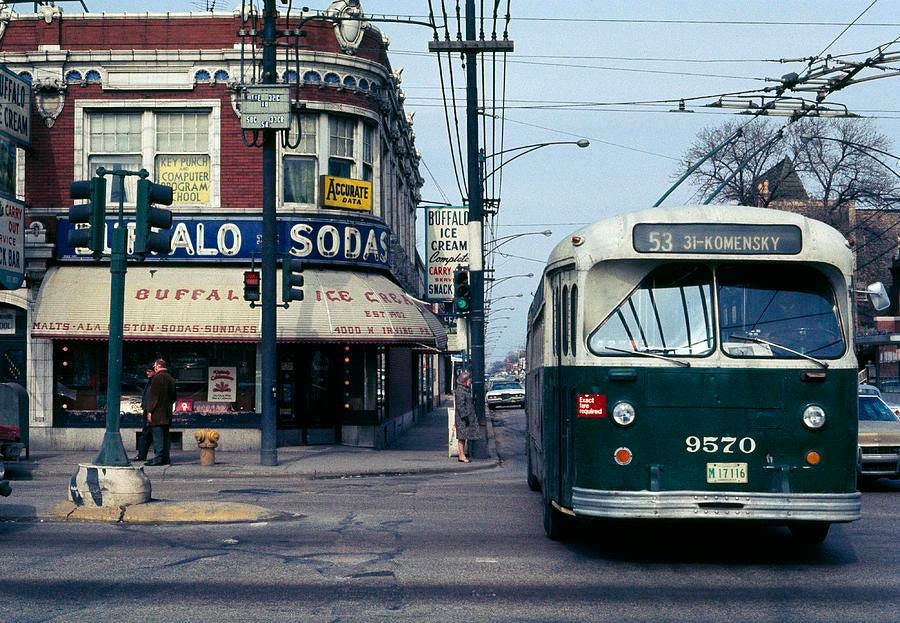
“‘Pulaski and Irving, in Chicago. Greeks run it. They know how to make sundaes. Try it sometime.’
“He looked a little dazed. They’re not used to somebody really worldly.”
NOTE: We will visit The Buffalo in next week’s Weekend Edition. Mike doesn’t mention favorite restaurants etc. all that often, so when he does, we sit up and pay attention.
This week, a look at the Royko family’s European vacation.
As we here all know, weekends could be sad for a Daily News family because Mike Royko wasn’t in the Daily News’ single weekend edition. So we look for Mike elsewhere on weekends.
A European vacation for a modest Chicago family in 1972? For the working class son of a Polish-Ukranian immigrant, who grew up above the family’s bar on Milwaukee?
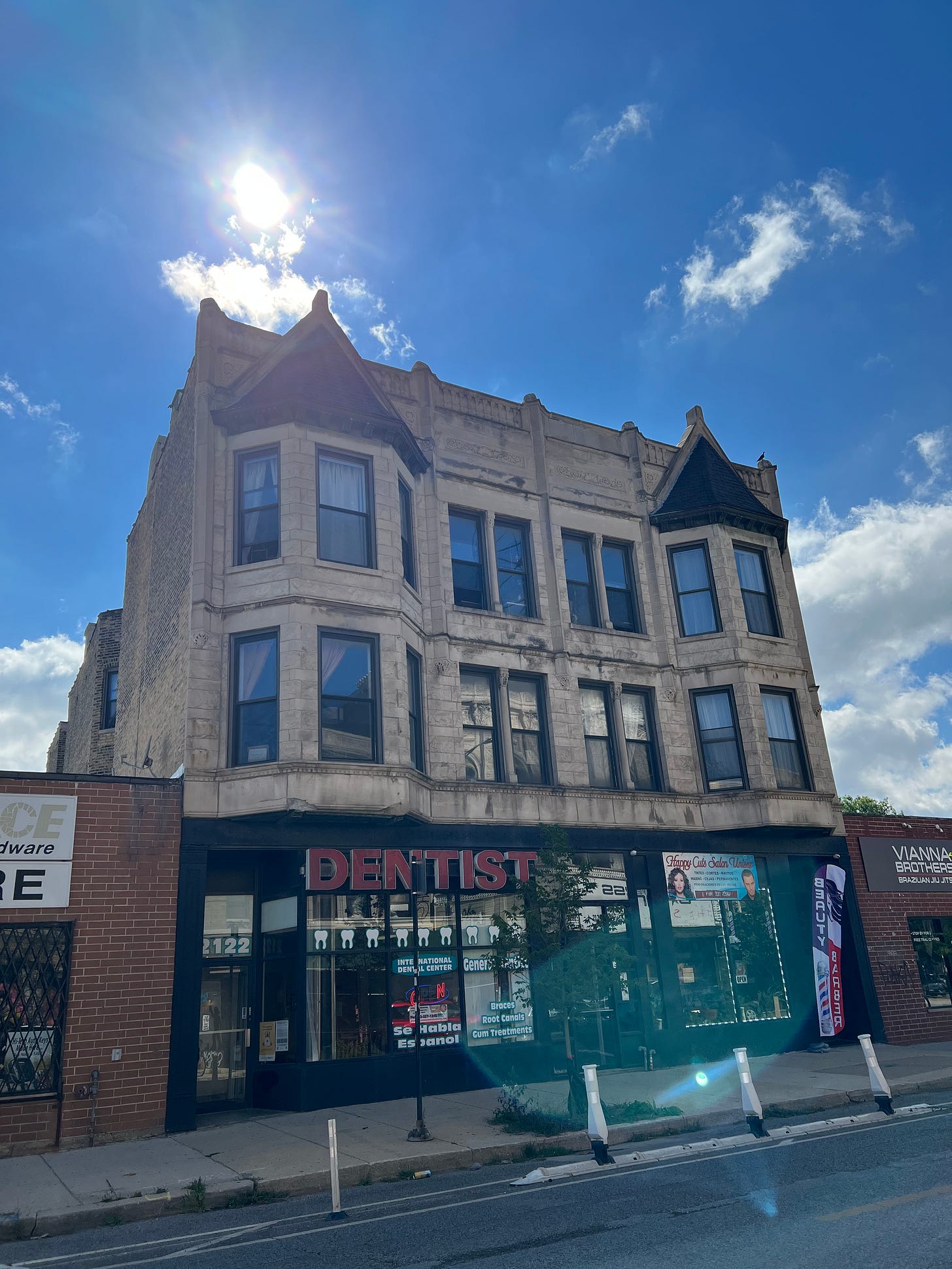
Hard to believe! But 1972 was even better for Mike Royko than the preceding nine years, when he’d gotten the chance to write in the Daily News op-ed section, and quickly turned his space into THE Chicago newspaper column.
In 1971, Mike Royko’s “Boss” came out to rave reviews—we won’t count Father Andrew Greeley’s. In 1972, “Boss” won the Pulitzer Prize.
Here’s David Royko, Mike and Carol Royko’s oldest son, in Richard Ciccone’s biography, “A Life In Print”:
“I remember the first royalty check….I remember my father sitting in the kitchen, and he and my mother were just staring at each other and my father was just beaming. He had this strange look and my mother had this smile and was shaking her head like, ‘I can’t believe this.’ I remember saying, ‘What, what is it?’ My father said, ‘You want to see something?’ I said, ‘Sure,’ and he said, ‘You can’t tell anybody about this. You can’t tell your friends.’ He showed me this check for $35,000 and, of course, I couldn’t appreciate what that much money meant except I knew it was a lot.”
Later, Royko asked him, “Do you know what it’s like to get this check? I’m going to show you what it’s like.”
“My father got two five-dollar bills from his wallet,” David Royko continued, “and he handed [little brother] Robbie and me each a five-dollar bill. We got like fifty cents a week for an allowance, and I looked at him and said, ‘Can we keep this?’ And he said, ‘Yeah,’ with that big grin….and my dad said, ‘That’s what this check is like.’”
Ciccone notes that Royko “got a new $50,000-a-year contract from the Daily News” in 1972, which is $337,500 in 2022 money. And “Boss” royalties were rolling in.
It allowed Mike and Carol Royko “to fulfill a fantasy: a family trip to Europe,” writes David on a page of his personal website devoted to the trip. David generously gave me permission to dip into the page, but of course, any reader here will want to see the whole thing.
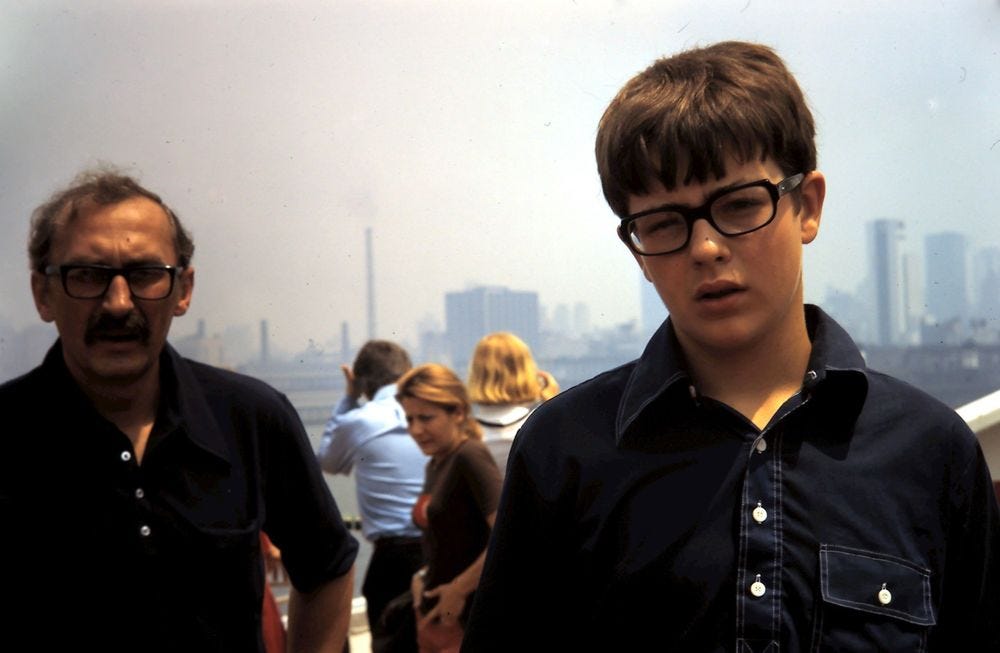
“Planning as diligently as the Allies in 1944,” writes Ciccone, “he took his family to see the land of Shakespeare, Balzac, Beethoven, and Bach.”
An apt description, since from David Royko’s accounts, Royko ran the vacation like a general. David writes that he and brother Robbie “came to practically hate Europe.”
The family got there not by plane—remember Mike is afraid of flying!—but by train to New York, and via ship to Europe. (See June 9 and the Weekend Edition at this link for more on Mike’s fear of flying.) David gives a slight correction to Ciccone’s book: the family traveled tourist class, not first class.
The kids were kids—the passage across on the SS France was great because there was plenty to do on the ship, running free with no bedtime. Once on land, though, “all we did was traipse around and look at ruins and art and architecture,” David told Ciccone. More:
“If it wasn’t significant, [Mike Royko] had no interest in it. If my mother stopped to talk to a sidewalk vendor or somebody who made scarves, my father would mutter, ‘God damn it, we have to go.’ He had something else he wanted us to see even if we didn’t want to see it. He had planned to see everything in Europe that was significant for 2,000 years and he wanted to do it in thirty days.”
In “The World of Mike Royko,” Doug Moe writes that Royko liked telling a certain story about that voyage on the SS France:
“A blowhard in the ship’s bar was voluntarily dispensing his worldview, and eventually he turned his attention to Chicago politics. The man’s ignorance of the subject proved vast. Royko stood it for as long as he could, then said, ‘That’s wrong. I’m from Chicago and that’s wrong.’ The man said, ‘Your trouble is you don’t understand Chicago politics, how it really works. There’s a new book out by a guy named Mike Royko and if you read it, then you’ll know.’
“At which point Royko grabbed the man’s hand, shook it, and said, ‘My name is Mike Royko.’”
Next came the customs agent in England, as David Royko told Ciccone:
“The guy looked at my dad’s passport and said, ‘Oh, Mike Royko. Chicago. Terrible place.’ My father loved that.”
By the way, this feature is no substitute for reading Mike’s full columns. He’s best appreciated in the clear, concise, unbroken original version. Our purpose here is to give you some good quotes from the original columns, plus the historic and pop culture context that Mike’s original readers brought to his work. Sometimes you can’t get the inside jokes if you don’t know the references. Plus, many iconic columns didn’t make it into the collections, so unless you dive into microfilm, there’s riveting work covered here you will never read elsewhere.
If you don’t own any of Mike’s books, maybe start with “One More Time,” a selection covering Mike’s entire career which includes a foreword by Studs Terkel and commentaries by Lois Wille.
Do you dig spending some time in 1972? If you came to MIKE ROYKO 50 YEARS AGO TODAY from social media, you may not know it’s part of the book being serialized here: “Roseland, Chicago: 1972.” It’s the story of Steve Bertolucci, 10-year-old Roselander in 1972, and what becomes of him. Check it out here.
To get MIKE ROYKO 50 YEARS AGO TODAY in your mailbox weekly along with THIS CRAZY DAY IN 1972 and new chapters of the book—
SUBSCRIBE FOR FREE!




